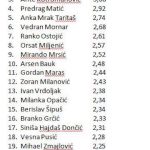“The interdepartmental commission has made a study which will be the basis for the government’s decision,” Banožić told reporters ahead of a government session.
He added that other bodies, such as the competent parliamentary committee, would take part in the decision-making process.
Banožić noted that many had tried but failed to contaminate the military aircraft procurement process through the media and that the government now “entirely controls the situation” and would make a mature decision on the dynamic and conditions of procurement.
The minister announced that in mid-March the government would present an official plan for the procurement of arms for this year.
“This year… procurement will be done according to individual groups of products. There is for the first time a new source of financing, the EU Defence Fund, and the Defence Ministry will be not only a supplier but one of the partners in projects that are expected to increase the productivity of our firms and in which we will participate through the first component, research and development,” the minister said.
Banožić said that the ministry would not only act in the process as the legal entity to carry out the procurement procedure but would also serve as a platform for making new prototypes.
He added that this was why amendments to the law on the establishment of the Dr Franjo Tudjman Defence and Security University would be submitted for a second reading in parliament.










